Three decades on, it’s difficult to overstate the significance of Australia II’s victory in the 1983 America’s Cup.
Three decades on, it’s difficult to overstate the significance of Australia II’s victory in the 1983 America’s Cup. Faced with 132 years of American domination, and staring down the barrel of a 3-1 deficit in the best-of-seven match races, the Australian victory remains our most hallowed sporting triumph. Of course, that win was much more than a mere sporting triumph. In an era when our borders were opening, our tariff barriers crumbling, that triumph represented Australia’s emergence on the international stage. It confirmed everything we wanted the world to see in us: our pluck, our strength, our cheeky genius.
As skipper of Australia II, John Bertrand’s name will forever be synonymous with that triumph. But, in truth, the ’83 America’s Cup forms only a sliver of Bertrand’s sporting resume. He represented Australia at the 1972 and 1976 Olympics, claiming a bronze medal in the Finn Class at the notorious Montreal Games, while mounting three unsuccessful America’s Cup campaigns in ‘70, ’74 and ’80. He also skippered oneAustralia, the ill-fated challenger in the ’95 Cup that broke apart in rough waters off San Diego.
Bertrand is a true sporting icon in this country. He’s chairman of the Sport Australia Hall of Fame, chairman of selectors for the Australian Olympic sailing team and president of Swimming Australia. He has also launched Monash University’s John Bertrand Leadership Series, a program benchmarking Australia’s finest leaders from the sporting, commercial, technological and military spheres.
In Bertrand, the program has a fine skipper.
On the 30th anniversary of that famous triumph in Newport, Rhode Island, Inside Sport sat the great man down for a yarn.
Is it hard to believe it’s 30 years since your America’s Cup victory?
In some ways yes, in other cases no. Yes, in that 30 years is a long time. And no, in that people still come up to me in the street to tell me what they were doing when we crossed the line all those years ago. It’s quite amazing ...
The cultural significance of that victory was monumental in Australia. Bunkered down in Newport, did you have any concept of how big it was becoming back home?
Even if we dreamed, in our wildest dreams, how big that win could’ve been, it would’ve been maybe a quarter of the true size. No one in their right mind could’ve visualised the impact that it had. And nor did we want to. The consequences of winning or losing at that stage of the game were enormous; pondering the size of those consequences would’ve been counter-productive to us getting on with the job out there on the water. Of course, word was coming through – people were phoning through from Australia. But we tried to limit all contact. We stopped reading newspapers and we got rid of all the television sets in our crew compound. We just disappeared into our own bubble. Regardless of that, it was growing ever-clearer that the groundswell of support was becoming massive back home.
Is there a favourite memory that still lingers from that time?
Crossing the finish line in that final race after coming back from 3-1 down. I mean, the odds of doing that were 1000/1 against ... So when we crossed the line and the gun fired, it was just an unbelievable sense of relief. It was sensational. It still is ...
How did you celebrate that night?
Well, everyone around the team celebrated like there was no tomorrow. I remember skyrockets and balloons and thousands of people. But we’d been at it as a team for two and a half years, and that was my fourth America’s Cup, so I’d been at it as an individual for 12 years. So in that final day we just went into our own cocoons with our loved ones ... In our own way, we’d been at war for five months in Newport. We had to beat the Canadians and the French and the Brits and the Italians before we had the right to challenge the US. It was like a war zone for us. And when people come back from war, they often need to go into a rehab hospital, to get over what they’ve been through. You know, it took me three months before I could go to a dinner party and enjoy it in a normal, relaxed way. The day after we won, virtually everyone in the team – 34 people including the secretary – came down with a variety of illnesses. It was quite a case study ...It sounds like post-traumatic stress ...
Well, in five months, we had three days off. We were seven-days-a-week for five months. It was a supreme effort from the team.
From the sublime to the ridiculous, can you put us on the deck of oneAustralia in 1995 when it broke apart and sank?
For these projects, you push the envelope in every way, and that day in San Diego there was a set of extreme conditions that we never saw again. With the wind strength and the wave frequency, the boat was under extreme stress. And it wasn’t the only one: Dennis Conner’s boat nearly lost its keel and America 2 broke its mast. But the atmosphere that day was just one of shock. We’d been through all the scenarios – what if the mast breaks, what if a sailor gets injured – but we never went through the scenario of the boat breaking up and sinking, which was a catastrophic failure. So there was just an unbelievable sense of shock. It was something we just weren’t prepared for. But we then resurrected our trial boat and went on to beat all the other nations except New Zealand, so we were second in the elimination series. And then New Zealand went on to whitewash the Americans 4-0. So, in hindsight, I think we could’ve even beaten the Americans with our pace boat ... Yes, it was a total failure in terms of the boat sinking. But we still beat all the other nations except the Kiwis. It was a highly competitive project we had there ... It was a project I was actually very proud of. We achieved a lot. We didn’t win the America’s Cup, but we weren’t far off.
What are your thoughts on these multi-hull catamarans they’re now racing in the America’s Cup?
I like it. The America’s Cup’s always been on the leading edge – or the bleeding edge, as they say.
Yes, several months ago, one of my close friends was killed, a guy called Andrew Simpson, a British Olympic gold-medallist. He was a terrific guy and his death was absolutely tragic. And, yes, people have been killed in the America’s Cup before. These boats are not trivial. The loads are massive and if something goes wrong it can be deadly. In Andrew’s case, the Swedish boat Artemis cart-wheeled; as it broke apart he got caught underneath. They couldn’t find him quickly enough in the wreckage. But putting that aside, these boats are now sailing within their safety envelope. And the America’s Cup is very much technology-driven. It should always be about the best sailors in the world, the best managers in the world, and the best technology in the world. Currently, the America’s Cup boats reflect that. But it’s a very different style of sailing to what I was involved with. We’re talking about super-high speeds – these boats are now sailing three times the speed of the wind. Their top speed is around 50 knots now ...
So you feel the competition’s as prestigious as ever?
Absolutely. The America’s Cup is very high-profile, particularly in Europe. It’s still the most prestigious sporting event in the world. Yes, we see little profile in Australia, but to be honest, we’ve seen very little profile since 1987 when we lost it. We climbed our Everest ...
There’s a host of Australian sailors on boats contesting this year’s Cup, but no Australian team. Is this purely due to a lack of corporate support?
Well, it’s never really been about corporate funding. But, firstly, let me say this: there are more Australians involved in the America’s Cup in San Francisco than any other nation in the world. We’ve now surpassed New Zealand in terms of supplying knowledge, technology and sailors. But, as we say: no cash, no splash. We may have the best technologists and the best sailors, but if you don’t have the dollars required to fund the research and the development and the training regimes, then it’s all hypothetical. The bottom line is that these projects are now too expensive. They’re $100 million-projects spread over three years. In my opinion, that needs to be scaled back to $40 million to get multiple teams involved.
Secondly, the economic model of the America’s Cup has never been a corporate model. These projects are much more expensive than corporate funding can manage. They attract multi-billionaires who want to move from being a regional trader to a global trader. So, invariably, the $100 million-projects we’re seeing at the moment are being sponsored by individuals. Take Larry Ellison, the founder of Oracle software and the current holder of the America’s Cup. In my opinion, winning the Cup has lifted him from being just another American billionaire, to an extremely prominent figure on a global basis. It’s the prestige that’s associated with winning the America’s Cup that’s of extreme interest to these entrepreneurs. And that’s been the same model over the 160 years of competition.
Does the America’s Cup need to get away from this situation where the winner sets the rules? Does it need to come back to a more consistent format?
Well, there’s no question that there’s confusion out there with the changes that have happened over the years. But it cuts both ways. The interesting quirk about the America’s Cup is that the winner takes all, including the ability to change the format if they see fit. And I think a big part of the intrigue of this event is that aspect, the deed of gift. If you take that away and have a controlling body, then I think there’ll be less interest. Yes, it’s logical to have a governing body. But does it take some of the magic away? Possibly, yes.
You’re the chairman of selectors for Australia’s Olympic sailing team. You must have been thrilled with the nation’s results in London last year ...
Absolutely. Unlike the America’s Cup, the Olympics is the puritanical cutting-edge of sailing. It’s a totally different animal altogether. But having been involved in two Olympics myself, it was a great thrill to see the Australian team perform with the professionalism it showed in London.
The sailing medals certainly bulked up our London medal tally. Can you see sailing becoming the new swimming in Australian sport?
Well, we sent 13 sailors to the London Olympics and we won three golds and one silver. Of course, the reality is, you can only win one event per competitor in sailing, whereas a swimmer can win multiple medals. So if you talk about bang for your buck, swimming will always supersede pretty much any other sport we compete in at the Olympics. But I think the potential results for Rio 2016 look very strong. The administration’s extremely tight, highly focussed and very professional in its attitude. We’re seeing a cycle that’s evolved since the 2000 Olympics.
Mat Belcher recently won yet another world championship ...
Yep, his fourth world championship in a row – something that’s never been done in the history of the 470 class. An amazing result. Mat’s an extremely focussed and intelligent athlete. He’s also got Victor Kovalenko – the most successful coach the world of sailing has ever seen – supporting him. To have those types of people leading the team in terms of culture and focus is extremely powerful for our sailing team.
You won Olympic bronze at the infamous 1976 Montreal Games, where the Australian team returned without a single gold medal. What was the atmosphere like over there?
Well, us sailors were in Kingston, Ontario, which is west of Montreal, so we were apart from the village. But those ’76 Games was the last of the weekend warriors for Australia ... It really was amateur hour for us. In the Finn class, where I was sailing, the East Germans won the gold, and those guys were extremely well practised and had great support. I had no coaches, no nothing. My wife and I got $14 a day to cover our expenses. We were sleeping in the back of the car ... Of course, that didn’t change the attitude or the motivation, but relative to the Eastern Bloc nations, we were a world apart.
− Aaron Scott
Related Articles
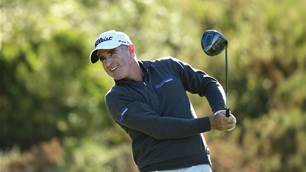
Video interview: Drinks With ... Matt Millar
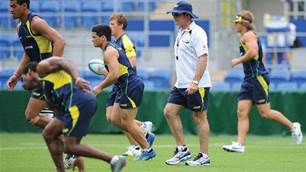
Michael O'Connor still an asset to Aussie 7s squads
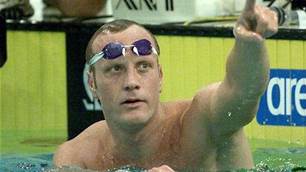

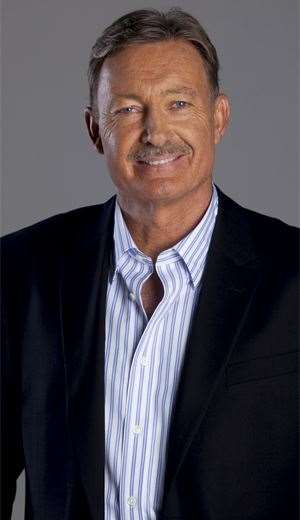
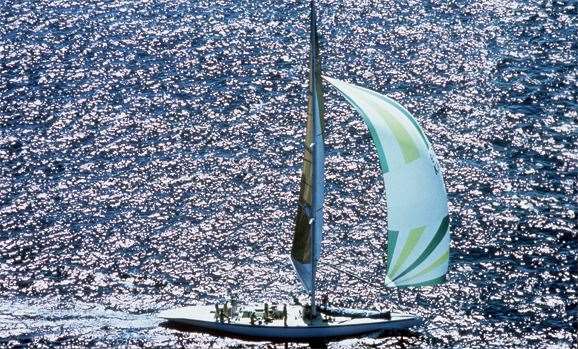
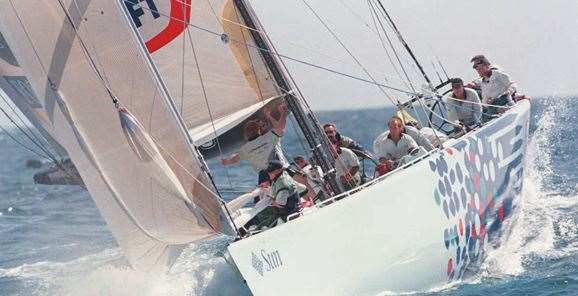
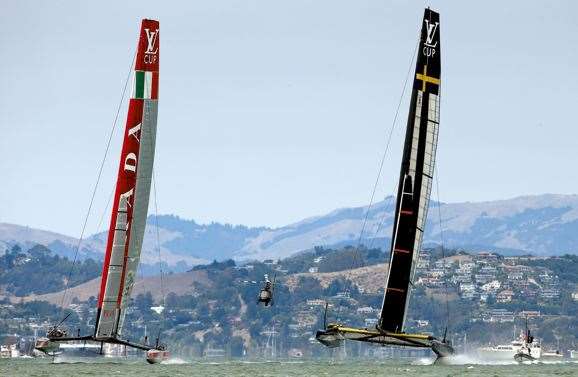
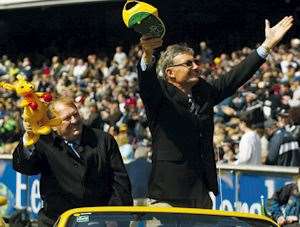
.png&h=115&w=225&c=1&s=1)










